“Fingertalk” a cafe run by the deaf in Indonesia has become a successful philanthropic business in Indonesia. It owes its success to the experience and determination of Dissa Syakina Ahdanisa, a graduate from Ritsumeikan Asia Pacific University (APU). APU is a university located in the famous hot spring city of Japan — Beppu, Oita prefecture. It was after her graduation that she has embarked on a path to become a social entrepreneur focusing on helping the deaf community in her home country of Indonesia. APU is renowned for having multicultural environment with foreign students from 86 countries (as of May, 2017) and for having a strong bond between the university and Oita community through various local activities. The school aims to give students more than just a four-year higher education, but also a unique life experience, which is hoped will result in producing open-minded, brilliant, and inspiring graduates who embrace the term ‘differences’ and challenge the world to do the same.
Dissa founded ‘Fingertalk’ in May 2015, a business which has expanded from a single cafe to two fully operating cafes, one workshop/craft store, and a recently branched out into a car wash business. What’s special about Fingertalk’s business model is its goal to connect the deaf community with the hearing community by hiring all deaf employees. While aiming for that long term goal, Dissa hopes that for now, Fingertalk can create job opportunities for the deaf, be a fun place where people enjoy universal pleasures, such as food and artwork, and be a place where people can learn something new — particularly sign language. Hence, ‘Fingertalk’, named by the young social entrepreneur herself, represents the way the deaf community communicate by sign language. In Indonesia, sign language is called Bisindo.
On 2 June 2017, Dissa came to APU’s Tokyo campus to give a talk about her life after APU, specifically about the Fingertalk business and her recent visit to schools for the disabled in Oita prefecture, supported by the local government. The event was flooded with interest from APU alumni owing partly to the fact that in September 2016, the former president of the United States, Barack Obama, had spoken of Dissa and praised her for her inspiring work in the Youth Southeast Asian Leaders Initiative (YSEALI) in Laos.
Dissa said when she was 10 years old, she became fascinated with sign language having met a deaf person who taught her how to spell her name at an event in an old folks home where she accompanied her mother. During her time in APU, she found her passion for volunteer work and took several trips to many countries with a mission to contribute in some way to a better society. After graduating from APU, Dissa obtained her masters’ degree in Australia and worked in the Singapore headquarter of one of the world’s top financial institutions. However, she continued to pursue her passion for volunteer work. During one of her volunteering missions, she spent three months in Nicaragua where she heard of a cafe with deaf employees called ‘Cafe de Las Sonrisas’. She decided to visit the cafe and was very inspired by the concept. Having remembered the man she met as 10-year-old combining with her passion for the non-profit field, Dissa felt an urge to create a similar cafe in Indonesia. After a considerable amount of research, she found that Indonesia has more than 6 million people with disabilities, and of which, more than 470,000 are deaf. And the more prominent problem is that more than 70% of people with disabilities there are not working, let alone receiving proper education.
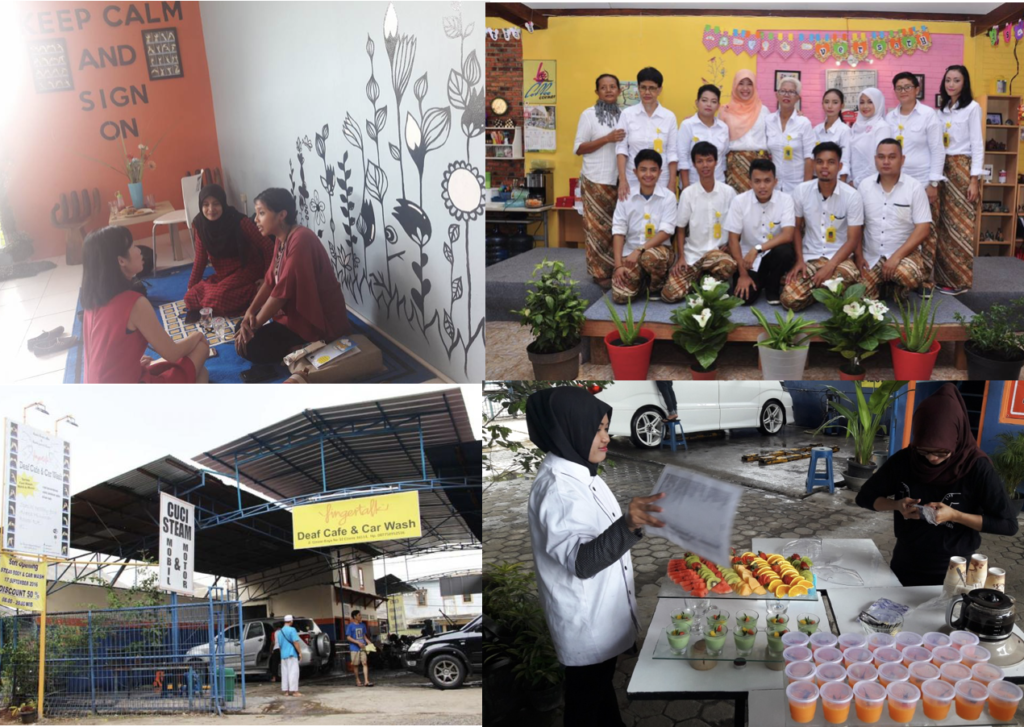
At the event in Tokyo, when asked about her biggest obstacles in opening ‘Fingertalk’, Dissa admitted that she had a rough beginning. Though some people supported her idea, it was hard for her to raise funds to realize her cause. So, she decided that she would have to do it all by herself. She intended to save as much money as she could from her job in Singapore and at the same time, she started learning Singapore Sign Language (SgSL) and American Sign Language (ASL) in order to understand more about the deaf community and make new friends. Eventually, she kickstarted ‘Fingertalk’ in Tangerang City, Indonesia, and soon after, left her job at the financial institution to pursue her dream full-time.
‘It all started by getting to know someone from the deaf community. Then, they started introducing me to their friends and people they know. That’s how I started recruiting people for Fingertalk. I started by interviewing them with pen and paper when I wasn’t fluent at Bisindo. I needed to find out what they can do, and what they aimed to be. Through the process, I luckily met one deaf lady who allowed Fingertalk to use part of her house as the first cafe for free. This jumpstarted our business.’ says Dissa. Despite the hurdles of the financial obstacles, the location, and the staff recruiting she had to manage, the cafe took off and people started coming into the cafe. In the cafe, there are sign language posters everywhere in order for the people from the hearing world to try and communicate with the employees. With this, Fingertalk took one step closer to its mission—connecting the two worlds and teaching people something new. With more and more people coming in, the employees also feel more motivated to communicate and work hard. More importantly, this help them to believe in themselves and their abilities. According to Dissa, the biggest challenge she faces is ensuring that the employees’ self esteem remains intact; that they don’t feel any less confident than those who hear.
This year, Dissa and some of the staff from Fingertalk came to visit Beppu, Oita where APU is located. She also visited schools for children with disabilities. The city government of Oita Prefecture generously supported Dissa fully in all the trip arrangements. Together, they visited Oita School For The Deaf (大分県立聾学校) and Beppu Special School.
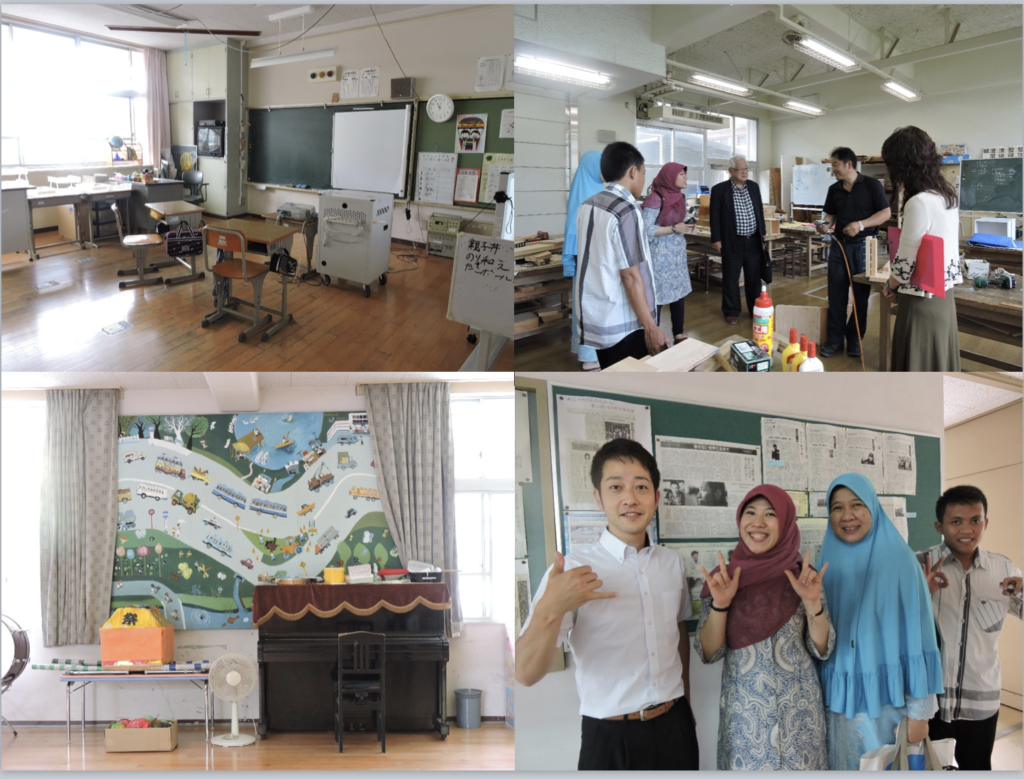
According to Dissa, the schools have such great facilities for children that can support their learning and creativity. The atmosphere was warm and fun. Even in a deaf school, they have a piano where the children can enjoy music through the vibrations on the floor. Dissa felt like Japan is at least 40 years more advanced than Indonesia in terms of educational and life opportunities support for people with disabilities. She was also impressed with how caring the teachers are. One teacher in particular, a deaf teacher who did not let his abilities be an obstacle for him to doing things such as learning English, she found to be very inspirational. Other than the schools, she also visited Taiyo no ie (太陽の家)or ‘The Sun Industries’ — an organization established in 1965 after the Paralympics in 1964 with the motto that more than charity, what’s more important today is creating employment opportunities for disabled people. To provide employment opportunities to people with disabilities, Sun Industries have made partnerships with large companies such as Sony, Omron, Denso, Fujitsu, and others. This is another example of a good support system that Japan has for people with disabilities. After the trip, Dissa is determined to make use of her new knowledge to help people in Indonesia through Fingertalk.
Dissa mentioned how supportive APU alumni and the faculty members have been to Fingertalk.
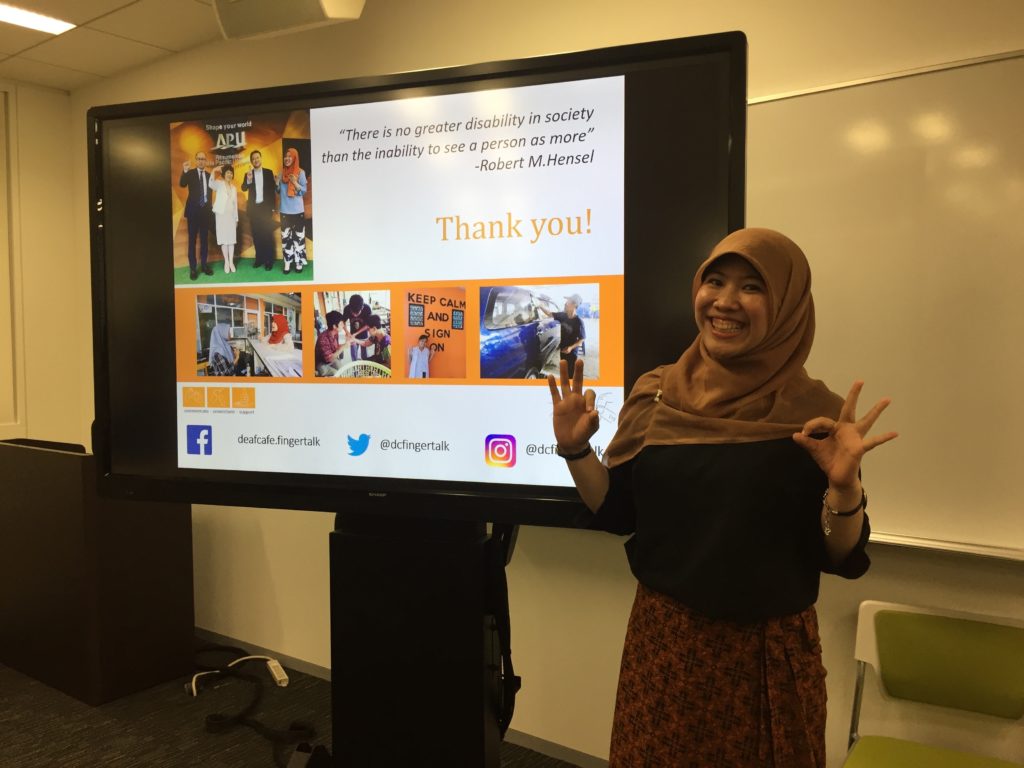
Not only have friends from APU paid visits to the cafe, but also Professor Kenji Yokoyama, a vice-president of APU. Dissa finds suggestions from alumni from all over the world useful and interesting since each country has different pros and cons in the support system toward people with disabilities. At the event, one alumni even suggested a tool similar to Google Translate for sign language, something to consider in the future. Some others asked about the future of Fingertalk whether it is the expansion of business into different areas or expanding its focus to people with other types of disabilities. Dissa’s answer was that she is now focused on helping deaf people but the long term goal is to definitely help people with other type of disabilities as well. Now Fingertalk is still small but she is aiming to expand its services and footprints.
After two years of founding Fingertalk, the business has attracted interest from media and local government and received awards such as Tokoh Metro 2017. Fingertalk’s crew have also been invited to attend many events such as Inovasi Indonesia Forum & Expo and Festival Kewirausahaan. When asked of what keeps her going with such positive energy, her answer was that “I want people to learn something from me when they meet me, even if it is just the sign of Beppu”. She taught use our right hand to create something that looks like number three and our left hand as a horizontal C to cover the base of our right hand, making the three fingers visible. With two hands pounding each other twice, it becomes ‘Bep-pu’ — the three fingers represent steam wafting from hot water, for Beppu is famous for its hot springs. Later, she personally taught me how to say ‘Thailand’ in sign language. It’s a very clever and fun way to sign my homeland. You use an index finger to point to one’s nose and slide the finger down and outward from yourself. This represents elephants, the symbol of Thailand. It’s something I’ll never forget. And that is part of why Fingertalk works so well, because the people working there and those visiting are always learning something from each other. It’s not just a meal and a drink, it’s a rewarding experience.
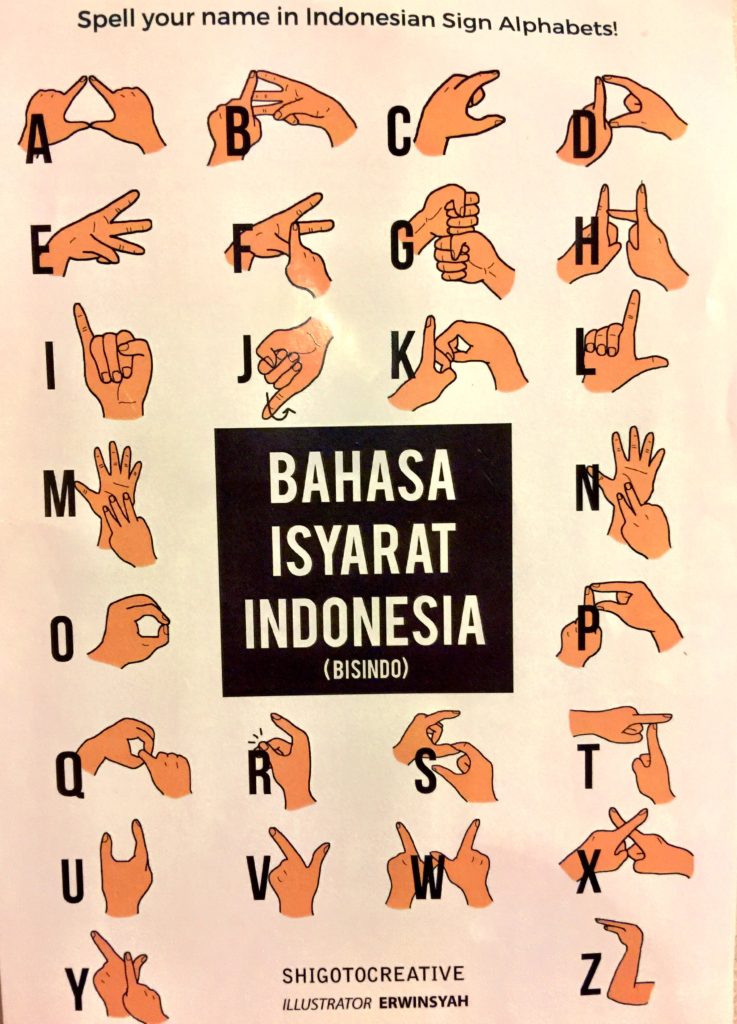
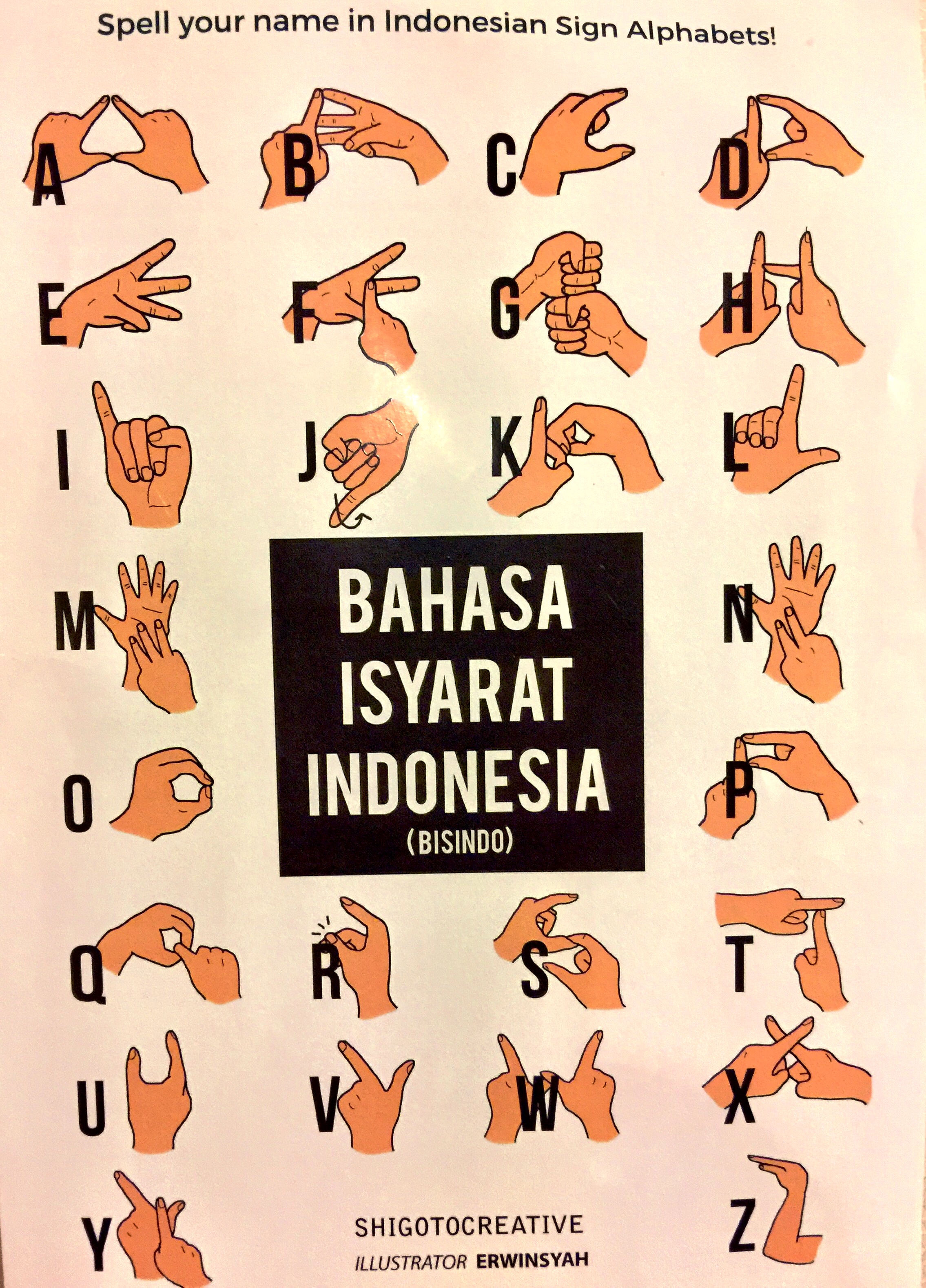
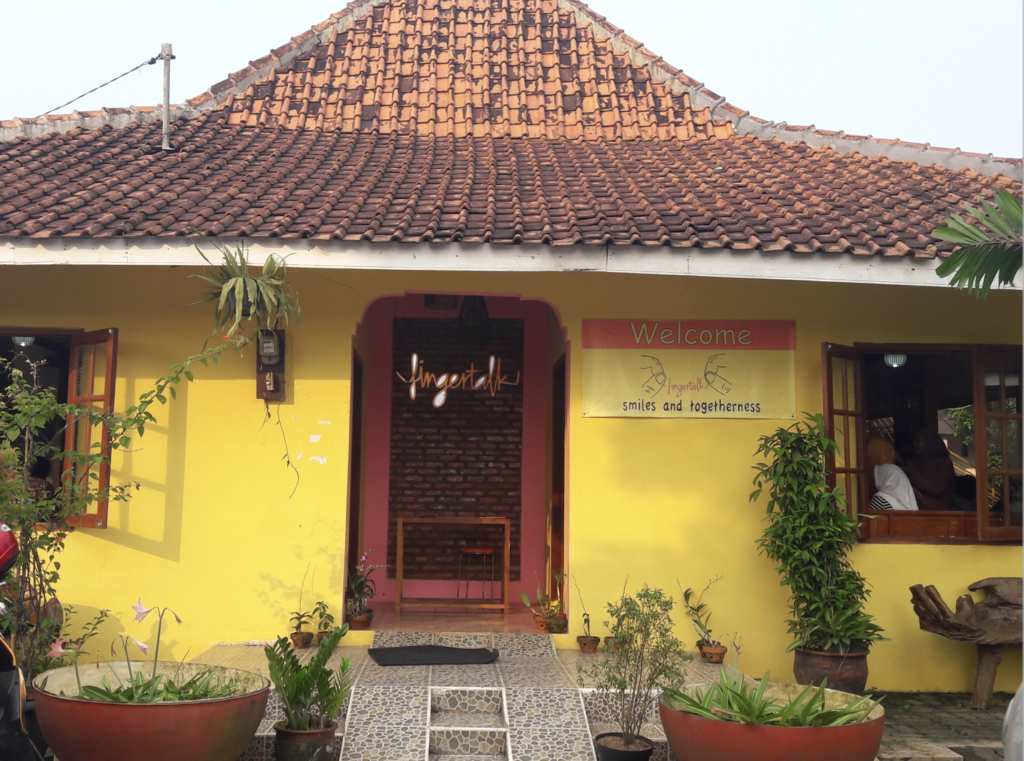
A fascinating story on this cafe. It is interesting to learn a bit about APU as well. A nice change of pace from stories on organized crime or the sex industry. More of these, please.
Thank you. The focus of the blog tends to be on the seedy side of Japan with a dash of uplifting news but we will try more of these.
Thank you so much for the article! I’ll be sure to visit if I’m ever in Indonesia.
Does anybody know of any sign language cafes in Japan (preferably Tokyo)?
Some fun trivia: While people in England and the USA largely speak English, their respective sign languages are not mutually intelligible at all. Japanese SL looks more like American SL but it is very different.
Judging by Basindo’s fingerspelling it’s close to British SL, but it has some American influences in there. The thing that stands out most to me is how intuitive the alphabet signs are.